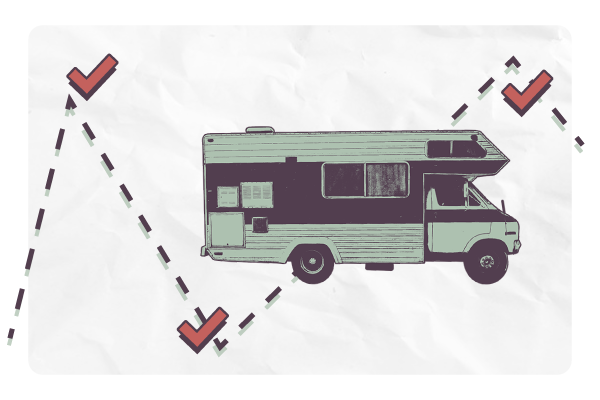Editor’s Note: Originally published on his LinkedIn profile, this story from BDO’s Daniel Gold is a fun take on parallels between our industry and vacation life. We hope you enjoy it!
I just came back from a two-week, 2,700 mile RV trip with my family. There's so much to unpack from that one short little sentence. Namely, we're not RVers, we're not campers, and we've never done this before. So, along with the usual risks associated with an RV trip across half the country, there was our inexperience and putting all five of us in close confines for 14 days straight.
Through all of our amazing experiences, I couldn't help but think throughout our trip how much this was just like the practice of e-discovery. Seems odd, right? Read on!
1. You Need a Plan
For those who have traveled in an RV, you know that there are a lot of complexities involved in ensuring that everyone is safe and that the journey goes exactly the way you've mapped it out. Therein lies the first step: You need a plan. The idea of traveling from Kansas to Mount Rushmore and Yellowstone Park, in theory, sounded great; but what few things must absolutely go right in order for us to get from Points A through Z? What are our critical success factors? What don't we know that we need to be prepared for?
For the RV trip, this meant: Where would we be stopping along the way? Do they have "full hookups" (i.e., electricity, water, and sanitation for the RV), can we rent a car from the RV park, and how far off the path is it to get back on the road to our next stop?
In e-discovery, it's no different. You need to have a plan. You need to understand what the end goal is and work backward from there. For instance, where is the data, what file format is it in, what type of metadata are we dealing with, are we sure we know all custodians and their devices they've made data on, what are our search terms, are they proportional, and has everything been agreed upon by both sides at a Rule 16 and 26 conference?
2. Do you have checklists?
As RV novices, we needed to be onboarded by the RV rental center on how to use literally every aspect of the RV from the inside to the outside. It's mildly overwhelming, to say the least. The goal is to onboard us to what we don't know so that when it's time to execute, we're good. It took a full hour just to walk through everything—and I reflect upon whether that was actually enough time! The biggest concern was really the "hookup" and the "disconnect" at the RV parks for the water, electricity, and sanitation. Everything imaginable can go wrong (but not as bad as Cousin Eddy from the Griswolds movie!); from electrocution to ... well, anything in sanitation.
For our trip, what I found was that the secret to our first-timer success was an audible checklist between me, my wife, and our oldest at each RV location. At every stop, the three of us, out loud, said the step we were doing before we did it and the others confirmed that step out loud. There was a process—a rhythm, if you will, to ensuring that each task, which had multiple dependencies, was done correctly before moving on. This allowed the proper order that everything needed to go in and ensured not a single check was unticked.
e-Discovery is no different. I've written before about the benefits of a checklist in e-discovery, and this experience really codified it for me. While we don't need to say the steps out loud like a surgeon asking for a scalpel or a pilot preparing to land, the practice of e-discovery does require the most mundane to be recorded on paper (or online somewhere). To execute appropriately in e-discovery, where potentially everything from processing in the wrong time zone to not producing in the right format to producing privileged documents, can and will go wrong. Having checklists that trusted e-discovery managed services providers, project managers, paralegals, and lawyers can work on together as One Team helps to ensure not a single check is not appropriately ticked off.
3. Acting as One Team
Throughout the RV trip, unexpected events happened—such as 55 mile-per-hour winds in South Dakota moving the RV sideways across the highway like a sailboat in the ocean, and then the "traction control" light illuminating as well as cruise control turning off as a result. That resulted in reading the driver's manual, calling roadside assistance, and calming the kids that everything was okay while simultaneously working with Roadside Assistance. (Yes, that great fun!) This unnerving event required spousal support, children maintenance, and communication with a Roadside tech support. All of us had to be working in sync and as One Team for us to get through this event. Even during this experience (which actually happened every time wind hit the RV), I couldn't help but think that this was so much like e-discovery.
In e-discovery, we must act as One Team as well. Working together with a trusted e-discovery service provider, the legal department, and a law firm is what makes One Team. Working in concert with one another on The Plan to communicate critical success factors on what must go right from Point A to Point Z, having checklists and documentation that is shared across this team, and working with business intelligence dashboards that drive real data transparency and drive down the costs of e-discovery is what makes the experience in e-discovery vastly more successful than operating in myopic silos in hopes everything will just work out in the end. To operate as if one person or group of people are simply "order takers," , not as important as the rest, is what will throw the journey off course—or in the case of the RV, right off the road!
Wrapping Up
Incredibly, after 14 days and 2,700 miles, we still have our three children, and my wife and I love each other just as much! The sites we saw were breathtaking and we learned a ton along the way—and it was not just the history of what we saw. It was about the life lessons we learned about the need for a plan, communicating about checklists and documentation, and operating together as One Team to make the experience the best one ever. The same will always apply when it comes to e-discovery!











